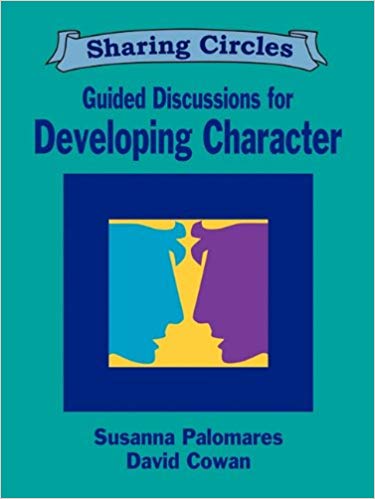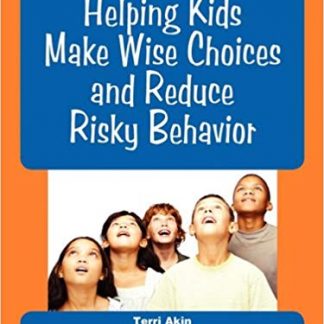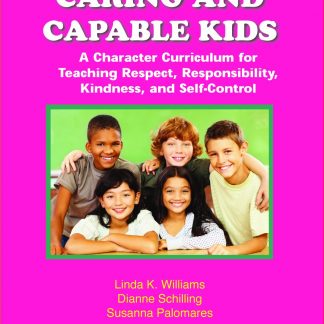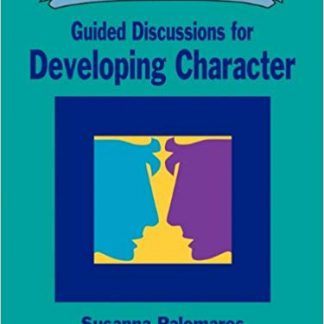Guided Discussions for Developing Character
$19.95
Susanna Palomares & David Cowan
Sharing Circles: Guided Discussions for Developing Character has been created to provide educators and youth leaders with a simple and easily implemented means of infusing character development and its related skills into the school day.
What better way to develop character in your students than by involving them in relevant discussions about ethics and moral reasoning? Sharing Circles are a character development super-strategy, and this book is filled with these powerful and versatile counseling tools that will help your students learn the value of virtue and how to develop and draw on inner reserves of moral conviction.
You’ll have at your fingertips a wide range of character development traits all ready for you to get your students involved in meaningful discussion and reflection. Each character topic has the ability to get students sharing and learning on a deep level about character and other important life issues.
Because character is demonstrated in the simple elements of everyday life, when you and your students discuss something like “A Good Choice That I’m Glad I Made,” or “Something Nice I Did For A Friend,” you are touching on character in all its dimensions and nuances. You are able to view, reflect on, and learn character through connecting it to everyday thoughts, feelings, and behaviors. Therefore, this book provides a wide variety of topics, some dealing directly with a recognized character trait and others getting at character through an indirect approach. The character connections come about through the responses of the students both in the sharing phase and as they answer the key questions and engage in discussion.
Table of Contents
- How to Use This Book
- Developing Character
- Sharing Circles: The Character Education Super Strategy
- Creating Your Own Sharing Circle Topics
- Sharing Circle Topics (Over 90 Topics)
Sharing Circle Topic Areas
- Empathy
- Respect
- Open-Mindedness
- Fairness
- Generosity
- Forgiveness
- Perseverance
- Responsibility
- Trustworthiness
- Honesty
- Citizenship
- Positive Attitude
- Courage
Why Educate for Character?
Because we don’t just want smart kids, we want good kids!
“Intelligence, plus character, that is the goal of true education”… Dr. Martin Luther King, Jr.
Education has always attempted to develop good people. Even during periods when educators were told that they must not teach values, they did anyway. They modeled kindness, caring, and respect; punished cheating, stealing, and lying; rewarded industriousness; and emphasized the importance of good citizenship in the context of a just and fair school community.
Responsible behavior begins with ethical thinking, and helping students to think—to solve problems, make decisions and render judgments—is clearly the job of the school. Along with language, math, science, and art, schools must teach acceptable standards of conduct, and the attitudes and attributes that foster them. Smart is not enough to sustain the principles and belief systems upon which our society is built. Good, the estranged twin, belongs in this picture.
Because, to some degree, good comes before smart!
To consistently do their best work, students must value excellence, even if it’s just an excellent grade. Few students can do well in school without work and work requires diligence. If every child came to school with well-developed senses of responsibility, honesty, integrity, and fairness, teaching would be easy. But since, both practically and developmentally, this is impossible, schools are left with no choice but to instill values right along with the other basics. They always have. They always will. The difference is that today many schools are again teaching values deliberately—through the curriculum.
Primary Subject Area – Character
Grades 3-8, 128 pages, 8-1/2 x 11, paperback
Description
Susanna Palomares & David Cowan
Sharing Circles: Guided Discussions for Developing Character has been created to provide educators and youth leaders with a simple and easily implemented means of infusing character development and its related skills into the school day.
What better way to develop character in your students than by involving them in relevant discussions about ethics and moral reasoning? Sharing Circles are a character development super-strategy, and this book is filled with these powerful and versatile counseling tools that will help your students learn the value of virtue and how to develop and draw on inner reserves of moral conviction.
You’ll have at your fingertips a wide range of character development traits all ready for you to get your students involved in meaningful discussion and reflection. Each character topic has the ability to get students sharing and learning on a deep level about character and other important life issues.
Because character is demonstrated in the simple elements of everyday life, when you and your students discuss something like “A Good Choice That I’m Glad I Made,” or “Something Nice I Did For A Friend,” you are touching on character in all its dimensions and nuances. You are able to view, reflect on, and learn character through connecting it to everyday thoughts, feelings, and behaviors. Therefore, this book provides a wide variety of topics, some dealing directly with a recognized character trait and others getting at character through an indirect approach. The character connections come about through the responses of the students both in the sharing phase and as they answer the key questions and engage in discussion.
Table of Contents
- How to Use This Book
- Developing Character
- Sharing Circles: The Character Education Super Strategy
- Creating Your Own Sharing Circle Topics
- Sharing Circle Topics (Over 90 Topics)
Sharing Circle Topic Areas
- Empathy
- Respect
- Open-Mindedness
- Fairness
- Generosity
- Forgiveness
- Perseverance
- Responsibility
- Trustworthiness
- Honesty
- Citizenship
- Positive Attitude
- Courage
Why Educate for Character?
Because we don’t just want smart kids, we want good kids!
“Intelligence, plus character, that is the goal of true education”… Dr. Martin Luther King, Jr.
Education has always attempted to develop good people. Even during periods when educators were told that they must not teach values, they did anyway. They modeled kindness, caring, and respect; punished cheating, stealing, and lying; rewarded industriousness; and emphasized the importance of good citizenship in the context of a just and fair school community.
Responsible behavior begins with ethical thinking, and helping students to think—to solve problems, make decisions and render judgments—is clearly the job of the school. Along with language, math, science, and art, schools must teach acceptable standards of conduct, and the attitudes and attributes that foster them. Smart is not enough to sustain the principles and belief systems upon which our society is built. Good, the estranged twin, belongs in this picture.
Because, to some degree, good comes before smart!
To consistently do their best work, students must value excellence, even if it’s just an excellent grade. Few students can do well in school without work and work requires diligence. If every child came to school with well-developed senses of responsibility, honesty, integrity, and fairness, teaching would be easy. But since, both practically and developmentally, this is impossible, schools are left with no choice but to instill values right along with the other basics. They always have. They always will. The difference is that today many schools are again teaching values deliberately—through the curriculum.
Primary Subject Area – Character
Grades 3-8, 128 pages, 8-1/2 x 11, paperback






Reviews
There are no reviews yet.